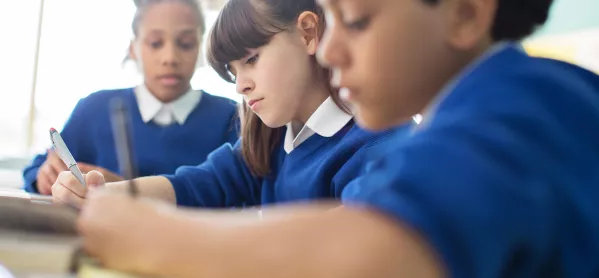I have been earning my living by writing for quite a while.
“I’d like you to go and sit the Sats paper”, said my boss. “It’ll be interesting”.
And so here it is - the piece I was sent out to write - and possibly an unintentional resignation letter.
Sitting in front of a Year 6 spelling, punctuation and grammar Sats paper - correction, not even an entire paper just ten questions - I did wonder how I was going to explain my performance when I got back to the office.
Yes. My name is Helen Ward. And I cannot identify an adverbial.
This was, to be clear, not a task devised by Tes editor Ann Mroz (or even the Tes grammar guru Adi Bloom) but by the More than a Score campaign - a parents’ group which wants to see the current test system in schools overhauled.
More than a Score had asked 15 venues to organise a “Sats sit-in” with an estimated 300 parents turning up to have a go at ten maths and ten grammar questions.
To give the parents (and journalists) at Surrey Square primary school in Southwark the full Sats experience, teacher Sara Tomlinson warned us sternly not to look at each other’s papers, put our mobile phones away and keep to the allotted ten minutes. Year 6 pupils were there to distribute and mark the papers.
The first ten questions were all taken from the 2018 Spag paper, a paper which teachers described as “fair” and the test which the highest proportion of children pass - 78 per cent reached the expected standard this year.
But when asked to identify the adverbial in the sentence “On Wednesday, Felix has a dental appointment”, I could only think “but why?”
Time up and onto the maths. This time a mix of questions taken from the arithmetic and second reasoning paper - the one which teachers described earlier this year as a “nightmare”.
There was a classic tricky multiplication and subtraction question and something about the length of a day on Mercury - it was a glimpse into the post-calculator world (the maths paper which allowed pupils to use a calculator was scrapped in 2014).
At least, I thought, that means there is one 40-minute period in their lives when these 10 and 11-year-old children, who are already adept at video-editing, producing short films and mixing music, are not staring at a screen. Instead they are dividing 645 by 43 - the long way round.
And so to the real reason we were there, the scores. Nope. No-one wanted to share their scores. Of course children’s scores will be passed onto their secondary schools.
Afterwards there were mixed feelings about whether the Sats were useful or not - some parents felt there was too much pressure on children, but others thought that children needed that push to prepare them for secondary.
Then all us adults could all get up and go back to work with (hopefully) little to lose.
But for the Year 6 pupils watching it wasn’t just a game.
“It was funny watching the parents,” said Surrey Square pupil Anjolaolwua, 10. “They were shocked when they got their results.
“But I am very worried about Sats - because the Sats papers are hard.”




